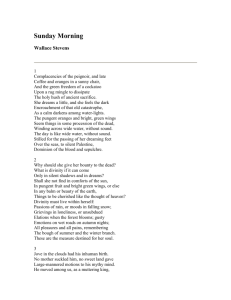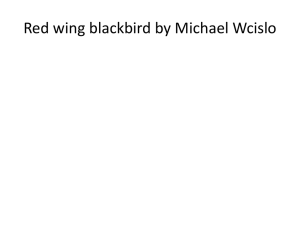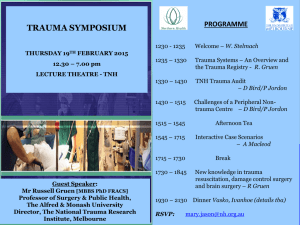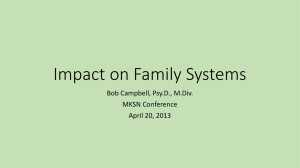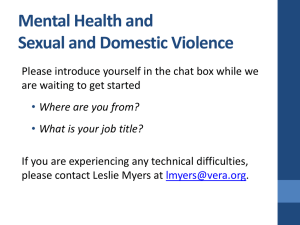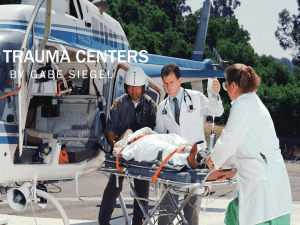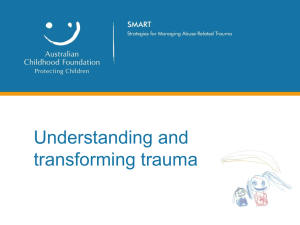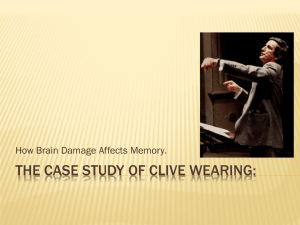- Matthew Lindgren, LMFT
advertisement
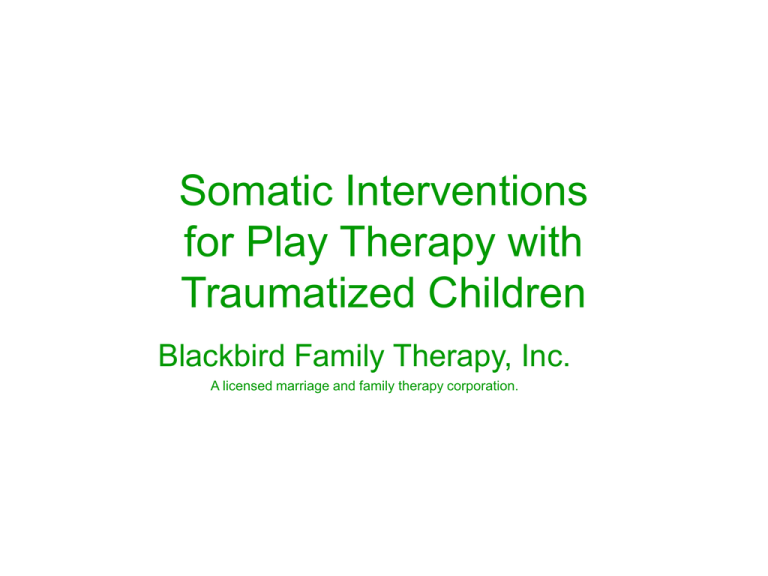
Somatic Interventions for Play Therapy with Traumatized Children Blackbird Family Therapy, Inc. A licensed marriage and family therapy corporation. Outline • Introduction to Somatic Therapy • Basics of Somatic Trauma Therapy • When and Why to Use Somatic Work in Play Therapy • How to use Somatic Interventions in Play Therapy Blackbird Family Therapy, Inc. Intro: What Is Somatic Therapy? • Somatic therapy focuses on how emotions and memories are expressed in the body. • Emphasis is on how things “feel” rather than what one thinks: Client: “I know that I'm a good person, but I don't feel that way.” Therapist: “Where do you feel that way in your body?” Client: “I feel it like a heaviness in my heart.” Therapist: “What is it like to place your hand where it feels bad?” Client: “It feels a little better.” Blackbird Family Therapy, Inc. Intro: How does ST Work? • Basic tools of somatic therapy include body awareness and intentional use of the afferent nervous system (from the body to the brain). • Although rarely advertised as such, many somatic interventions resemble behavioral interventions such as progressive relaxation, counterconditioning, affect tolerance, and exposure therapy. Blackbird Family Therapy, Inc. Intro: What “else” is Somatic Therapy? • • • • • • • • • • • Dance Athletics Meditation (e.g. Vipassana) Yoga Getting up & Lying Down Talking Funny Patticake Laughing Skipping Horse Lips Blowing Raspberries • • • • • • • • • • • Yawning Napping Rocking Jiggling Sighing Patting Humming Squatting Moaning and Growning Stretching Playful Retching Blackbird Family Therapy, Inc. Basics of Somatic Trauma Therapy • Track conditioned physiological responses to trauma in both therapist and client • Intervene with a resource that allows body awareness (because all trauma responses involve a lack of body awareness) • Teach client that s/he can handle similar responses in the future (with kids, this often done through modeling & attachment work) Blackbird Family Therapy, Inc. Basics: Responses to Trauma • Fight – we prepare to confront a potential aggressor or predator – anger, adrenaline, blood flow to muscles… • Flight – we prepare to flee a potential aggressor or predator – fear, adrenaline, blood flow to muscles… • Freeze – in situations where fight or flight are either impossible, or where these strategies fail, we freeze and prepare to survive the trauma – dissociation, endorphin release, blood flow to head and chest Children, and even therapists, often go into some form these responses when they are “triggered” by an internal or external cue that reminds them of a trauma. Often, as compassionate and empathic adults, we follow along with our clients unconsciously as they are triggered. Blackbird Family Therapy, Inc. Basics: Freeze States Freeze states often appear as combination of ANS & PNS symptoms, likely because the body is simultaneously preparing for flight or fight responses while also freezing Like stepping on the gas and brakes at the same time Freeze states are more associated with people who develop PTSD PTSD symptoms resemble both the activation of the SNS – hypervigilence, startled response, as well as PNS – dissociation, numb feelings, memory loss Blackbird Family Therapy, Inc. Basics: How To Pull Out of a Trauma Response • Bring awareness to your whole body, especially your hands and feet • Take slow, deep breaths, yawn • Intensely look at something you can see “right now” • Do something fun or different with your body... Blackbird Family Therapy, Inc. Basics: What Does Somatic Therapy Feel Like? • EMDR Light Stream Exercise Blackbird Family Therapy, Inc. Basics: Other Ways to Pull Out of Trauma Response • • • • • • • • • • • Dance Athletics Meditation (e.g. Vipassana) Yoga Getting up & Lying Down Talking Funny Patticake Laughing Skipping Horse Lips Blowing Raspberries • • • • • • • • • • • Yawning Napping Rocking Jiggling Sighing Patting Humming Squatting Moaning and Growning Stretching Playful Retching Blackbird Family Therapy, Inc. When to use Somatic Interventions in Play Therapy • With Yourself and Caregivers • When a child is “stuck” in a PTSD reaction such as fear, dissociation, or aggression – usually the child is unable to express the theme of the trauma in play • To consolidate gains and resource Blackbird Family Therapy, Inc. When: Working with Yourself & Caregivers • “Put on your own air mask before putting on your child's.” • Learning to regulate your own nervous system as a way of non-verbally teaching a child to do the same. • Winnicott and the “holding environment” • Resolving attachment through connection to a safe object vs. mirroring learned helplessness • Mirroring statements vs. mirroring affect • Learning to “unmirror” or break a trauma habit. Blackbird Family Therapy, Inc. When: Working with Caregivers • After you teach a parent or caregiver to “put on their own mask”, it can be helpful to teach them to do the following both in session (if applicable) and at home: • Therapeutic Touch • Stroking, soothing • Hugging, rocking • Coaching parent to stay present in their body with child to model how to do so for child Blackbird Family Therapy, Inc. When: Attachment Work Children always heal from trauma in the context of a safe and secure attachment bond. By strengthening the attachment bond, you are working on the trauma itself. You can train a caregiver to be able to handle a traumatized child's emotional dysregulation as well as questions about an event. Play therapy that involves the caregiver, along with somatic touch related interventions, are best. Blackbird Family Therapy, Inc. When: A child is “stuck” • Flight: a child is scared • Fight: a child is angry • Freeze: a child is scared and “frozen” or spacey, can also be “over cooperative” • The child is unable to express their situation in play, and instead acts out their situation “concretely” in relationship to you and others. • The goal is to intervene to allow the child the ability to use play to work through the trauma. Blackbird Family Therapy, Inc. When: Resource & Consolidate Gains Resource: something that was not available to the child at the time of the traumatic event that is available now: strength, loving adults, ability to say “no” and tell adults, etc. Building and developing resources helps children feel that they could handle the trauma if it happened again Resources can be internal: superheroes, good feelings, and external, actual people. Resources can be physical acts and sensations. Blackbird Family Therapy, Inc. How To Use ST In Play Therapy for Trauma Identify the Trauma Response: Flight, Fight, Freeze, through countertransference and/or observation Bring in a resource Complete the trauma response and/or choose a more appropriate one Blackbird Family Therapy, Inc. How: Working with Fear / Flight Fear often mobilizes energy for us to run from a situation, often in the legs, but also in the muscles in general. Blackbird Family Therapy, Inc. How: Working with Fear / Flight Completing the Response: • Where do you feel the fear in your body? • If in the legs, what would be like if we got up and ran around with that energy in a circle? Changing the Response: • Yell “no” at the fear and push it away with your arms. Blackbird Family Therapy, Inc. How: Fear: Resources • Tell me about someone who could handle this without being afraid? (Superheroes, family, cartoon & video game figures) Draw a picture of this person, show me how s/he acts Imagine that you are that person, how does that feel in your body? Notice that feeling. Blackbird Family Therapy, Inc. How: Working with Aggression Aggression often mobilizes muscles in the shoulders, arms, and chest. There is often a great deal of upper body readiness. The goal is often to complete the response, so the person can feel that they are able to protect themselves and feel safe. Blackbird Family Therapy, Inc. How: Working with Aggression • • • • Pushing Away with Arms Saying “no” Patticake Stomping feet Blackbird Family Therapy, Inc. How: Working with Freeze • Freeze states show up as dissociation, lack of body awareness, numbness, “going into your head” • Freeze states often happen in combination with a flight or fight response, like pushing on the gas and breaks at the same time • The goal is to bring the client back into body awareness, and then complete a different response such as flight or fight. • Freeze states are associated with PTSD and are very common with sexual abuse. Blackbird Family Therapy, Inc. How: Working with Freeze • Activity of any kind is the key, as well as body awareness. Almost any somatic exercise will work with a freeze state. • Jumping up and down, running around • It can be nice to choose an activity that would represent a different response or complete one, such as kicking or pushing for aggression, or running or walking for fear. • Pleasant, fun, and goofy activities are good too. Blackbird Family Therapy, Inc. Final Exercise • Pair up with one other person here who you don't know • Tell each other who each you used as your “difficult” person in the last exercise • Decide who will go first • Each of you will choose an appropriate play therapy somatic intervention for the other from the handout • Take turns performing your assigned interventions • Check in and see what happened. Blackbird Family Therapy, Inc. More Information You can download this presentation on the Web: http://matthewlindgren.com/EMDR-classes-consultations/somatic-play-workshop.html The first activity with the light visualization is from the very first part of the EMDR protocol, in which you prepare clients for work by resourcing. The activities for the final exercise are from Embodying Well Being, by Julie Henderson. The information about trauma responses and physiology are from Somatic Experiencing trainings. Blackbird Family Therapy, Inc.
